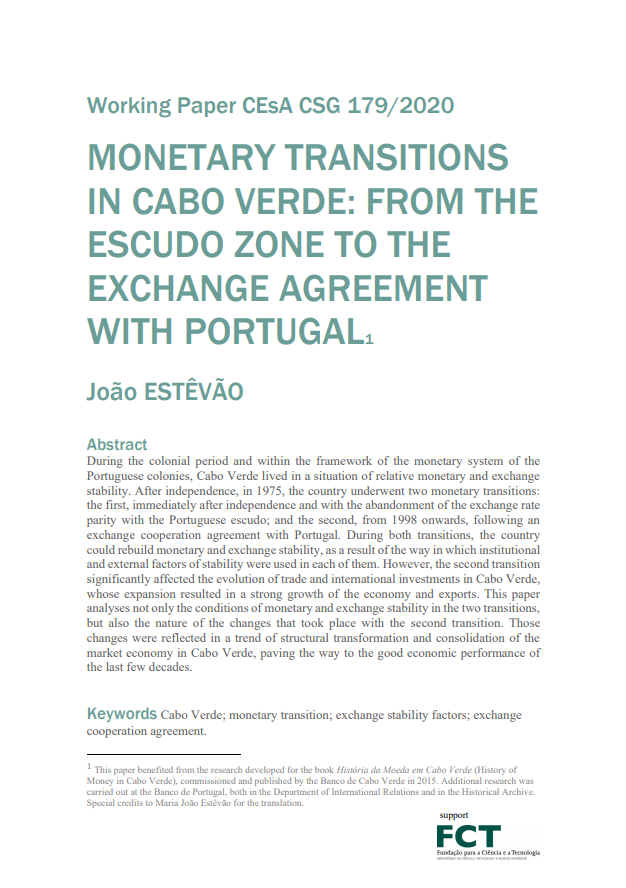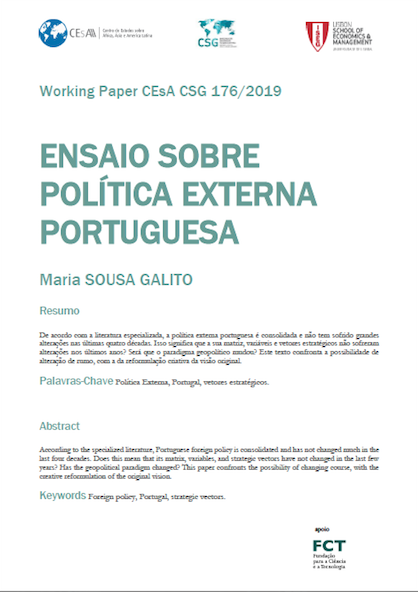Lusophone Space

Working Paper 179/2020: Monetary Transitions in Cabo Verde: From the escudo zone to the exchange agreement with Portugal
Abstract:
Monetary Transitions in Cabo Verde: From the escudo zone to the exchange agreement with Portugal studies how, during the colonial period and within the framework of the monetary system of the Portuguese colonies, Cape Verde lived in a situation of relative monetary and exchange rate stability. After independence in 1975, the country underwent two monetary transitions: the first, immediately after independence and with the abandonment of parity with the Portuguese escudo; and the second, from 1998 onwards, following an exchange rate cooperation agreement with Portugal. During both transitions, the country was able to rebuild monetary and exchange rate stability, depending on how institutional and external stability factors were used in each of them. However, the second transition significantly affected the evolution of international trade and investment in Cape Verde, whose expansion resulted in strong growth in the economy and exports. This article analyses not only the conditions of monetary and exchange rate stability in the two transitions, but also the nature of the changes that occurred with the second transition. These changes translated into a trend of structural transformation and consolidation of the market economy in Cape Verde, paving the way for the good economic performance of recent decades.
Quotation:
Estêvão, João (2020). “Monetary transitions in Cabo Verde : from the escudo zone to the exchange agreement with Portugal”. Instituto Superior de Economia e Gestão – CEsA/ CSG – Documentos de Trabalho nº 179/2020.

Working Paper 176/2019: Ensaio sobre Política Externa Portuguesa
Abstract:
In general, Portuguese foreign policy is “consolidated” and has not undergone “sudden changes of direction”. According to the national government, the founding matrix remains “well present and consolidated” although “denser, richer, broader”. What exactly does this mean? Our strategic vectors of foreign policy used to be three (Europe, Atlantic and Lusophony). Since the 1990s, some authors have admitted adding a complementary strategic pillar to the previous model. Which one? Three hypotheses. First, security, focusing on the international missions of the Portuguese Armed Forces within the framework of NATO (North Atlantic Treaty Organization), the EU (European Union) or the UN (United Nations). Secondly, cooperation, mainly technical and cultural, with Portuguese-speaking countries, but also with third countries. Thirdly, economic diplomacy, with exports, the diversification of the investment portfolio, the opening of the internal market to the world (and not only to the EU). According to specialized literature, Portuguese foreign policy is consolidated and has not undergone major changes in the last four decades. Does this mean that its matrix, variables and strategic vectors have not changed in recent years? Has the geopolitical paradigm changed? Ensaio sobre Política Externa Portuguesa confronts the possibility of a change of course, with that of the creative reformulation of the original vision.
Quotation:
Galito, Maria Sousa (2019). “Ensaio sobre política externa portuguesa”. Instituto Superior de Economia e Gestão – CEsA/ CSG – Documentos de Trabalho nº 176/2019.





